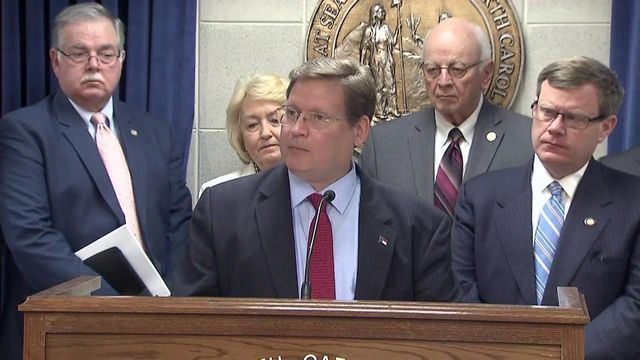House OKs $22.9B budget in early morning vote
The state House gave final approval at about 12:30 a.m. Friday to a $22.9 billion budget for 2017-18 that Republicans called a sound plan to meet North Carolina's needs but that Democrats say doesn't do enough to move the state forward.
Posted — UpdatedAfter an preliminary 82-34 vote Thursday night, the final vote was 80-31. The House and the Senate must now negotiate a compromise budget to adopt by the end of the month.
"This budget offers a strong opportunity for our citizens to continue to grow the economy, to continue to provide the services we need, to continue our efforts to improve education and performance in the classroom and to continue the promise of North Carolina as a growing and vibrant state," said Rep. Nelson Dollar, R-Wake, the chief budget writer in the House.
House Minority Leader Darren Jackson compared the proposal to Gov. Roy Cooper's $23.5 billion spending plan and said he finds the House budget lacking.
"It's clear to me what your priority was: Hitting an artificial number [for spending] set by a few leaders," said Jackson, D-Wake. "The desire for a tax cut came second, and the needs of the state came in a distant third."
Jackson said raises for teachers could have been larger, given the current budget surplus and cited a lack of money to expand broadband access in rural areas and limited money for school textbooks and to fight the opioid addiction epidemic as shortcomings in the budget.
"This House budget and the Senate budget are not the only choices," he said. "We can do better."
Rep. Billy Richardson, D-Cumberland, said it's time for North Carolina to invest in the future now the the state has recovered from the recession.
"We're becoming last in things we should be first in and first in things we should be last in," Richardson said. "The facts are indisputable. We're not meeting the needs of this state."
Cooper even chimed in with a late-night statement.
"This budget shortchanges our future at a time when we don't have to," he said. "As our economy rebounds, we must invest in our people to create good new jobs and more opportunities for middle-class families. This budget misses huge opportunities to spur economic development and help North Carolinians learn the skills they need to succeed in the workforce."
Rep. Michael Speciale, R-Craven, scoffed at the call to "do better."
"We can always do better if we had more money, but we’re not going to tax the citizens of this state out of their income and tax them out of their homes like was going on for years and years," Speciale said. "That’s why we’re in charge here and you’re not."
The GOP majority used its muscle during more than four hours of debate to beat back numerous amendments offered by Democrats, including proposals to implement the Jordan Lake Rules, which have been on hold for several years, for pollution control in the lake, to fund a scholarship program for community college students and to invest $8.5 million over two years in rural broadband.
"The budget we're debating, in my opinion, is leaving rural North Carolina behind," said Rep. Charles Graham, D-Robeson.
Dollar and other Republicans criticized the broadband expansion, along with another proposed amendment to provide more money for industrial sites in rural areas, because they would take money from an effort to modernize major state computer systems.
Five times, Republicans tabled amendments rather than casting votes on them. Two would have scaled back the proposed expansion of Opportunity Scholarship school vouchers to free up more funds for public schools, a third would have provided state retirees with a 2 percent COLA, the fourth would have shifted $1 million a year from crisis pregnancy centers to expand opioid treatment options and the last one would move $1 million from the budget of the education superintendent (legal fees and outside audit) into textbooks and digital learning resources.
Rep. David Lewis, R-Harnett, said lawmakers owe a debt of gratitude to retired state workers, but they also owe a duty to ensure the state can afford to keep making pension payments. "We cannot afford to do it at this time," he said in moving to table the proposal.
A number of other amendments never even made it to the floor because they were ruled out of order, such as one that would have barred Duke Energy from passing along the costs of its state-mandated cleanup of coal ash ponds to customers.
Rep. Jonathan Jordan, R-Ashe, tried to run an amendment that would have given a flat $1,220 raise to all state workers and teachers next year and $2,650 in 2018-19 to tell everyone they're valued equally, but House Speaker Tim Moore ruled him out of order on the floor. A parliamentary challenge to Moore's ruling failed.
"The 2017 House budget provides more income tax relief for North Carolina families, seeks a top-quality return on investment for their hard-earned dollars and saves for the future while making strategic investments in North Carolina’s rapidly growing population," Moore said in a statement.
Related Topics
• Credits
Copyright 2024 by Capitol Broadcasting Company. All rights reserved. This material may not be published, broadcast, rewritten or redistributed.






